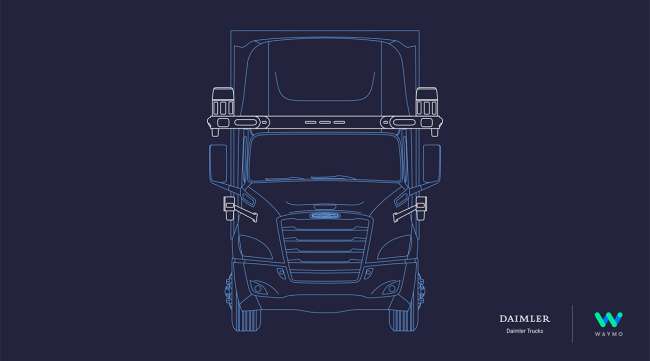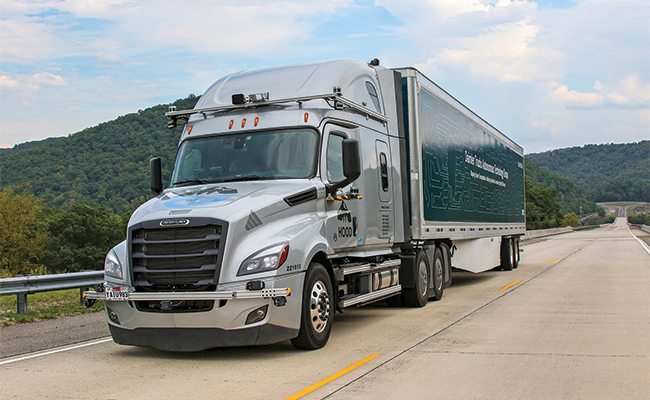Managing Editor, Features and Multimedia
Daimler, Waymo Partner to Develop Autonomous Trucks

[Stay on top of transportation news: Get TTNews in your inbox.]
Daimler Trucks and Waymo have joined forces in the quest to make fully self-driving Class 8 trucks a reality.
The world’s largest truck maker and the autonomous driving pioneer on Oct. 27 announced an agreement to produce highly automated commercial vehicles by combining Daimler’s trucks with Waymo’s technology.
Daimler Trucks North America will develop a version of its heavy-duty Freightliner Cascadia model with new components — such as redundant steering and braking systems — designed to safely enable autonomous operation.
Those trucks will be piloted by the Waymo Driver, an autonomous driving system that already is guiding unmanned passenger cars on public roads in Phoenix for Waymo’s ride-hailing service.

Daum
“In recent years, we have achieved significant progress on our global road map to bringing series-produced highly automated trucks to the road. With our strategic partnership with Waymo as the leader in autonomous driving, we are taking another important step towards that goal,” said Martin Daum, head of Daimler’s global truck and bus division.
On a conference call with journalists, Waymo CEO John Krafcik described the joint announcement as an “epic moment.”
“It’s rare when a leader in one space comes together with a leader in another space to make a new, revolutionary product together, but that’s exactly what we’re doing today with this extraordinary, strategic, global, long-term partnership,” he said.
The companies said they intend to offer the autonomous Freightliner Cascadia equipped with the Waymo Driver to fleet customers in the United States in the coming years, and will consider expanding to other markets in the future as part of the global agreement.
The development work is aimed at producing trucks capable of Level 4 automated driving as defined by SAE International, meaning the vehicle would drive itself with no input or backup assistance from a human driver, at least within certain parameters for which the system is designed.

Nielsen
That technology holds the potential to improve both road safety and efficiency for truck fleets, the companies said.
Ever-growing demand for road transportation creates a compelling business case for self-driving trucks in the United States, DTNA CEO Roger Nielsen said on the call.
“Automated trucks, we believe, have huge potential, not only for trucking companies, but for society, our customers and the overall economy,” he said.
While Daimler’s collaboration with Waymo focuses on the chassis rather than software, the truck maker also has been working on a separate Level 4 automated driving system in partnership with its Torc Robotics subsidiary.

Apart from its agreement with Waymo, Daimler Trucks also is developing autonomous driving technology in partnership with its Torc Robotics subsidiary. (Daimler Trucks)
Daimler acquired a majority stake in Torc, another pioneer in self-driving vehicles, in March 2019, and is actively testing its technology on public roads.
The truck maker’s separate development projects with Waymo and Torc ultimately could yield two different autonomous driving platforms from which fleet customers could choose.
Nielsen said this “dual strategy” is similar to the multiple options the manufacturer currently offers for engines and transmissions in its trucks. “Our customers demand choice.”
Waymo, meanwhile, has been independently testing its self-driving technology on Class 8 trucks on public roads dating back to 2017. Earlier this year, the company began testing Peterbilt models outfitted with its autonomous driving system on major interstates in Texas.
“We’ve been focused on adapting and deploying the Waymo Driver and using it in the Class 8 space,” Krafcik said. “It turns out there are a lot of synergies between driving in cities and driving big trucks.”
Waymo, which began as the Google Self-Driving Car Project in 2009, is a subsidiary of Alphabet Inc. and a sister company to tech giant Google. Waymo said it has logged more than 20 million miles of autonomous driving on public roads in 25 U.S. cities.

Waymo, which has introduced unmanned passenger cars in Phoenix, also has been testing its technology on Class 8 trucks. (Waymo)
Adapting that technology to the commercial truck market, however, will require the development and mass production of new vehicle components to ensure safety, Krafcik said.
“The development of redundant steering systems, redundant braking systems, redundant powertrain control systems is extremely important for this space to evolve,” he said. “On the Class 8 side, these components do not exist today.”
Daimler and Waymo did not provide a specific time frame for commercially launching an autonomous truck, but Krafcik pointed to component redundancy as one of the most important factors that will determine the pace of introduction.
Daum described the move toward Level 4 automation as “completely uncharted territory” for the heavy truck market. Daimler’s partnership with Waymo could shorten the timeline for commercialization, he said, but added that it remains “extremely difficult” to provide a specific target.
Daimler’s agreement with Waymo is the latest example of alliances forming between truck makers and autonomous driving companies.
Earlier this year, self-driving truck developer TuSimple formed separate partnerships with Navistar and Traton Group to develop Level 4 automated trucks in the United States and Europe, respectively.
Various developers of automated truck technology are pursuing a range of different deployment models, including dock-to-dock operations, relays between transfer hubs and yard automation.

Krafcik
Krafcik said Waymo initially is focusing its efforts on automating highway driving, but over time, the company intends to automate the entire journey from pickup location to delivery site.
“We do plan to unlock a full suite of driving capabilities — not just highway driving, but full hub-to-hub capability, including the ability to navigate very complicated city environments,” he said.
Over the years, truck manufacturers such as Daimler and several of their Tier 1 suppliers have been introducing increasingly advanced driver-assist technologies, but Krafcik said Waymo does not plan to compete in that segment of the market.
“We have no interest or designs on driver-assist systems,” he said. “That’s an apple and what we’re doing is an orange. … Our only intention, our only product at Waymo is a fully autonomous, L4 driver. That is our laser focus.”
Want more news? Listen to today's daily briefing:
Subscribe: Apple Podcasts | Spotify | Amazon Alexa | Google Assistant | More




